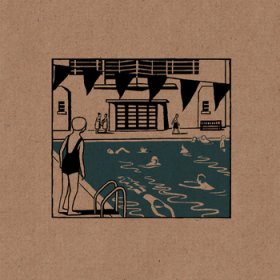Since freeing himself from the business ties that bound Hefner, Darren Hayman has become ever more prolific. His first fully instrumental record, Lido is the second of at least three albums due this year. Accompanied by a booklet of Hayman’s line and watercolour drawings, it addresses the civic dream of open air swimming pools, those that survive and those that have been lost.
When I was growing up, my family lived close to the open air Bathing Pool in St Leonards-on-Sea, a huge 1930s swimming complex that could seat 2,500 spectators on its terraces with a pool that took seven tides to fill. Local legend had it that the highest board on its Olympic-standard diving tower had to be removed after someone belly flopped from the top and split their stomach open on splashdown. It closed in 1986, and is now grassed over. I’ve never encountered its water’s salty, buttery taste again.
Hayman’s own childhood memory is of Brentwood Lido (closed 1976). As he described in a recent Quietus interview, he sensed a faint echo of his past at its former site, recorded this absence and concealed it in the mix. ‘Brentwood’ results in one of Lido’s sparser tracks, muffled, mournful guitar colouring his hometown’s loss.
Similar hazy field recordings can be detected in ‘King’s Meadow’ (Reading, closed 1974, still standing), the ghosts of absent swimmers dancing around Hayman’s delicate acoustic picking. Tracks in memory of Brighton’s Black Rock Baths and Morecambe’s Super Swimming Stadium also lean towards gentle melancholy, although their lethargic mood equally summons the feeling of floating serenely on one’s back, at peace with the overhead sky.
Despite the many dedications to pools now closed, however, Hayman’s album is predominantly celebratory, and threaded with the sounds of splashing water, yelping children and excited swimmers from many of Britain’s active, open lidos (London Fields; Parliament Hill; Tinside Pool, Plymouth). Often, the music aims for a matching, cheerful buoyancy, with bright, chiming melodies and a clear, freshwater production.
How much of Lido creates these memory triggers deliberately is debatable. Hayman admits that he began collecting the initial, then-untitled tracks together before the lido concept appeared, so some of the album’s effects may be entirely dependent on the listener’s personal response. The rolling, rippling ‘Saltdean’ sounds to me exactly like it’s designed to conjure the feeling of travelling up and down along the Sussex cliff road to Saltdean Lido, but that could be serendipitous. Mention should be made here of the underwater sonics of Clearlake’s Saltdean-inspired 2001 album Lido too, a fitting companion piece to Hayman’s.
For an album so successful at digging into personal memories, it’s also a happy accident that both ‘Brockwell Park’ and ‘Purley Way’ develop an unexpected, light reggae bounce, tapping into another buried strand of an early 70s childhood: the commercial sound of Trojan 45s on the radio (Bob & Marcia, Jimmy Cliff, Greyhound) and the absorption of this new pop form by musicians working in children’s television. It adds another streak of nostalgia to an album already drenched in the stuff.
Like his earlier series of Great British Holiday EPs, Hayman’s site-specific investigations into the nation’s neglected leisure pursuits have yielded evocative results. Even as a diversion from his lyrically focussed work, Lido adds to the developing picture of Hayman as a great chronicler of British life, present and past.


